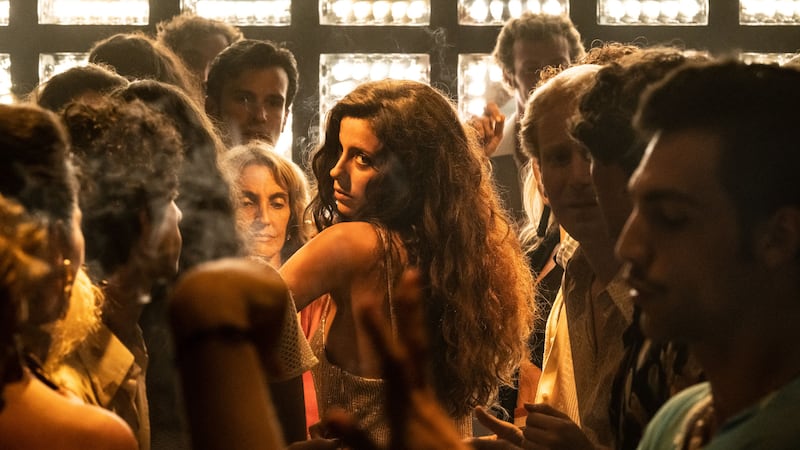‘Parthenope’ is a vapid and reductive exploration of a woman’s life
“What do you like in a woman?” - Parthenope in ‘Parthenope’

PHOENIX (AZFamily) — How would you define your life?
Synopsis
Parthenope (Celeste Dalla Porta) is a young woman growing up in Naples, Italy, in the 1960s-70s. Men, boys, and even some women are struck by her alluring beauty, desiring her affection at every turn. Parthenope has various flings with these people over the years, but keeps them all at an emotional distance, instead focusing on her academic career to become an anthropology professor.
My thoughts
People often say, “Write what you know.” It’s a statement that makes sense, even if it’s one I don’t entirely agree with. While an author should obviously do their research and gain some knowledge on the subject at hand, they don’t necessarily need to be “that person” or live the life they lived in order to tell their story. Many experiences of the human condition are quite universal and can be explored through various lenses.
That’s not to say that some storytellers don’t end up getting out of their depth when it comes to trying to write what they don’t know. Even if much of what people go through is universal, there are many experiences that are exclusive to certain genders, races, religions, sexual orientations, etc. Plenty of storytellers are able to overcome these hurdles and honestly embody their characters, but others are better off staying in their own lane.
More to life
Written and directed by Paolo Sorrentino, Parthenope follows our title character from the day she’s born in the waters of Naples in 1950, all the way into her old age in 2023. A majority of this is spent during her formative years from ages 18-35 where she travels the world, courts various lovers, pursues being an actress, and studies anthropology at a university under the surly Professor Marotta (Silvio Orlando).
Sorrentino chose not to focus on Parthenope’s academic pursuit, which is the most compelling part of her life, but instead tells a story about Parthenope’s many sexual relations during her travels. He states, “For me, Parthenope is, above all, a film about the sacred. About all the things that a woman has not been able to forget in her seventy-three years of life.”
There’s this grand story Sorrentino tries to tell about a woman learning to find herself from young to old adulthood, but it feels like you hardly learn anything about her. Imagine if an intelligent, accomplished professional in their field gave a TED Talk and decided to speak mostly about their sex life in their younger days. You’d be thinking the exact same thing I was thinking here and hoping they eventually get to the actual topic at hand.
Parthenope even says to one of her former lovers after they’ve grown up that it was just, “Young love and didn’t really mean anything.” So, why are we orbiting around these seemingly meaningless aspects of her life then? Obviously, the point is that she’s lying to herself, and they do mean something to her, but I stress the more engaging narrative about a woman becoming a professional in the academic field is literally right there.
Sorrentino even ends up completely dropping the ball at the end with Parthenope’s relationship with Professor Marotta. The development of their relationship is too sparse to begin with to provide any significant emotional impact, but Celeste Dalla Porta and Silvio Orlando have great chemistry with each other, so these scenes end up working. The resolution to this all falls flat, though, when Sorrentino takes such an absurd left turn that it comically deflates all the drama and character building that came before.
Reduction of a character
Worst of all, it’s way too long and frankly boring. Since Sorrentino chose to barely focus on Parthenope’s academic life, we’re treated to endless scenes of her going from locale to locale and having sex with men and women, young or old. It doesn’t matter. They all want her, and she has no problem taking advantage of that. This goes on for 137 minutes. When your movie feels longer than The Brutalist, a movie a full hour longer, then you know you’re doing something wrong. At least all of the Italian scenery looked pretty.
The constant sex scenes made it feel like Poor Things, but without the satire, depraved whimsy, or genuine themes of female empowerment. At least the sexual content in that had, you know, content! There’s hardly a connective tissue to any of the sexual escapades here and it doesn’t really seem to mean all that much when the story finally wraps up.
It all ends up coming off as quite reductive and demeaning towards women. Sorrentino is a man in his 50s, yet apparently thinks he can understand what a young woman goes through in regard to men taking advantage of her beauty and attraction? We end up seeing that Parthenope becomes an accomplished academic professor but Sorrentino decided to practically reduce her entire story to sex.
Bless Celeste Dalla Porta because she’s really trying with the role and whenever Sorrentino gives Parthenope a scene where she can show her depth, Porta is quite effective. The best and most emotionally resonant scene in the movie is when she walks around the slums of Naples and observes the people living in extreme poverty; along when Parthenope is in college, this is one of the few moments where we actually get to see some depth behind her eyes and not just seductive, sultry staring.
Final verdict
Shining a light on specific moments in a person’s life to explain how they molded them over time can be an effective narrative tool, but just because it’s a part of somebody’s life doesn’t mean it’s interesting. I’m not exactly sure what Sorrentino was going for with Parthenope and after reading his babbling in A24’s official press notes for this, I don’t even think he knew, claiming, “Parthenope is a mystery.” That’s certainly one way to put it.
However, one thing I do know is that Parthenope shares her name with a siren from Greek mythology which makes all the symbolism annoyingly blunt. She’s born in the water, making her a creature of the sea who lures men in with her beauty (i.e. voice) and then metaphorically drowns them in different ways (i.e. the men giving into their temptations). Do you get it?! Oh, I get it, Mr. Sorrentino. I just don’t care, because you didn’t really give me a reason to.
My rating: 4/10
Parthenope is available for purchase on digital platforms.
See a spelling or grammatical error in our story? Please click here to report it.
Do you have a photo or video of a breaking news story? Send it to us here with a brief description.
Copyright 2025 KTVK/KPHO. All rights reserved.






